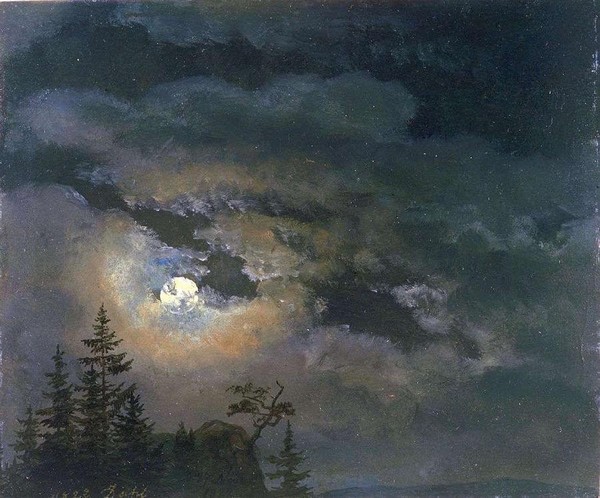
Last week we listened on Liederabend to An den Mond, D. 259, one of the Lieder included in Anna Lucia Richter's song recital at the SV16, a song that also was the first encore of Juliane Banse and Wolfram Rieger at their first recital. While chatting with M. about how easily different songs with the same title can be mistaken, she wondered why her favourite An den Mond, the D. 193, is sung so little, and she asked me to share it on this blog. So, that's our song this week, because M. asked for it and because it's also my favourite. By the way, if you ever get into a conversation where the catalogue numbers of the songs are mentioned so casually and you're not particularly keen of the genre, just keep away of it.
Out of the four moons written by Schubert (actually, there're six of them, because he also composed Der Wanderer an den Mond and An den Mond in einer Herbstnacht, but let's focus on the four sharing the title), two of them have the same poem by Goethe : the D. 259 that we listened last week and the D. 296; the other two, D. 193 and D. 468, have two poems by the same poet: Ludwig Hölty. That meaning that for the third time in the last five weeks our poet is Hölty: An die Nachtigall by Brahms, Hexenlied by Mendelssohn, and our moon today.
Hölty was one of the founders of the "Göttinger Hainbund", a group of poets created in 1772 by students at the University of Göttingen, which took Friedrich Gottlieb Klopstock, one of the most important literary figures of their time, as a reference and spiritual father. Schubert was very interested in some time in this literary circle of poets, and composed Lieder, for example, based on verses of Klopstock, Johann Heinrich Voss, Friedrich Leopold (better known by his title, Earl of Stolberg-Stolberg), Matthias Claudius, Christian Schubart and naturally Hölty. His brief work (he died of tuberculosis a few weeks before he turned 28) is rated as one of the best members of Göttingen and we can easily understand the affinity that Schubert had for the elegant verses of that melancholic, lonely young man, passionate for Nature. On 17 May 1815, Schubert composed his second Lied from a poem by Hölty (after a very early Totengräberlied, D44): our An den Mond (Geuß, lieber Mond, Geuß deine Silberflimmer). That very day he also wrote Die Mainacht, which we heard a few years ago, and during the following weeks he wrote ten more songs with poems by Hölty; in total, throughout his life he wrote twenty-six Lieder with his poems.
Maybe the prelude of An den Mond sounds familiar to you because it reminds us of the beginning of the sonata op. 27/2 of Beethoven, known as "Moonlight" and published in 1802. The oldest remaining copies don't have this prelude, probably the composer added it before the song was published (as op. 57/3) in April 1826. Schubert, as we know, admired the work of Beethoven so he could have known that sonata; however, the motif of the prelude was relatively common at that time and Schubert had already used it before. In any case, if Schubert used that motif because of Beethoven's sonata, it wasn't because the moon inspired the two composers: the nickname "Moonlight" was first used some years after Beethoven and Schubert's death; it was due to Ludwig Rellstab (one of the poets of Schubert's Schwanengesang).
After these opening measures that remind us of Beethoven, the song continues with the invocation to the moon, dreamy, in contrast to the second and third verse, more hectic, where the poet remembers hist lost love. In the fourth stanza, the song returns to the beautiful melody of the first one and its contemplative atmosphere. Shall we listen to it? Our performers will be Ian Bostridge and Julius Drake.
Geuß, lieber Mond, geuß deine Silberflimmer
Durch dieses Buchengrün,
Wo Phantasien und Traumgestalten immer
Vor mir vorüberfliehn!
Enthülle dich, daß ich die Stätte finde,
Wo oft mein Mädchen saß,
Und oft, im Wehn des Buchbaums und der Linde,
Der goldnen Stadt vergaß!
Enthülle dich, daß ich des Strauchs mich freue,
Der Kühlung ihr gerauscht,
Und einen Kranz auf jeden Anger streue,
Wo sie den Bach belauscht!
Dann, lieber Mond, dann nimm den Schleier wieder,
Und traur' um deinen Freund,
Und weine durch den Wolkenflor hernieder,
Wie ein Verlaßner weint!
Pour, dear moon, pour your silver glitter
down through the greenery of beeches,
where phantasms and dream-shapes
are always floating before me!
Reveal yourself, that I may find the place
where my darling often sat,
and often forgot, in the wind of beech and linden trees,
the golden city.
Reveal yourself, that I may enjoy the bushes
which swept coolness to her,
and that I may lay a wreath upon that pasture
where she listened to the brook.
Then, dear moon, then take up your veil again,
and mourn your friend,
and weep through the clouds
as one abandoned weeps!
(translation by Emily Ezust)












